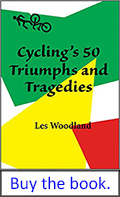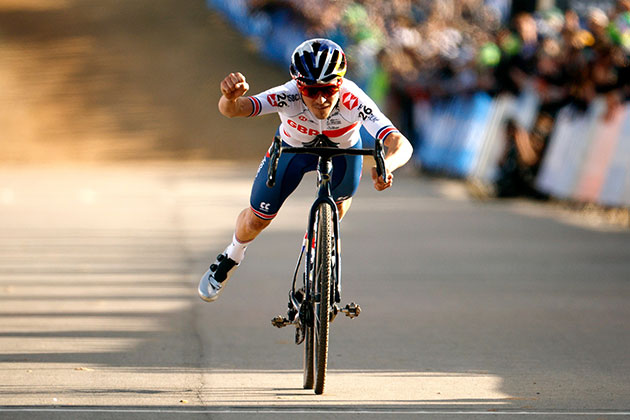

Bicycle Racing News and Opinion,
Tuesday, February 1, 2022
Back to news and opinion index page for links to archived stories | Commentary | Our YouTube page
2021 Tour de France | 2021 Giro d'Italia
An ant on the move does more than a dozing ox.- Lao Tzu

Les Woodland's book Cycling's 50 Triumphs and Tragedies: The rise and fall of bicycle racing's champions is available as an audiobook here. For the print and Kindle eBook versions, just click on the Amazon link on the right.
Current racing:
- Feb 1 -5: Saudi Tour
Upcoming racing:
- Feb 2 - 6: Volta a la Comunitat Valenciana
- Feb 2 - 6: Etoile de Bessèges
- Feb 12, 2022: Gavere Cyclocross
Latest completed racing:
- Jan 26 - 30, 2022: Challenge Illes Balears
- Jan 30: GP Cycliste la Marseillaise
- Jan 23 - 29 Santos Festival of Cycling
- Jan 30 - Feb 6, 2022:
Vuelta a San JuanCancelled - Jan 22, 2022: Flandriencross
- Jan 1, 2022: GP Sven Nys Cross
- Dec 30: Azencross
- Dec 29:
DiegemcrossCancelled - Dec 27: Heusden Zolder Cyclocross
- Dec 19: Namur Cyclocross
- Dec 11: Ethiascross-Essen
Here’s the report from Pidcock’s Team INEOS Grenadiers:
Grenadier Tom Pidcock rode a measured race before dropping the hammer on his rivals at the race’s half-way point, accelerating clear to win by an impressive margin of 30 seconds.

Tom Pidcock finishes the race his own way.
Victory marked a complete set of CX world titles for the Brit, adding to gold medals in both the junior and under-23 ranks. It also saw him make more history as the first British male to win the elite cyclo-cross event.
Despite being outnumbered by the Belgian team, Pidcock looked comfortable on the fast and dry course in Arkansas. After asserting himself on the opening lap, Pidcock was able to get the better of the battle for position within the leading pack.
At the end of lap four he made his move, capitalising on a slip from chief rival Eli Iserbyt to open out a gap. He rammed his advantage home on lap five as the Belgian team attempted to regroup, building a winning gap over Lars van der Haar and Iserbyt.
Fellow Grenadier Ben Turner was also in action for Great Britain and finished 14th after a strong ride on a memorable day.
Tom Pidcock:
"That was always going to be a super hard race. The drier it became the more the Belgians were trying to ride a tactical race. I just went out there as if I was going to war – I was having none of it – and I found my opportunity and made it stick.
"With Wout (Van Aert) and Mathieu (van der Poel) not being here I think it almost became harder to win the race. It was almost that everyone expected the race to be easier now. But you can’t go into the race with that mentality – it’s going to be a super hard race no matter who is in the race. But we came here with a plan and a process and we just stuck to the process.
"It turned out good in the end. But coming to America, arriving a week before, sitting in a hotel the stress just builds and it’s a tough one to manage for sure."
While trying to figure out if the Tour de Langkawi will be run in 2022 (it was cancelled in 2021 because of the Covid-19 pandemic), I came across this article in the Malay Mail from January 23, 2022:

Max Walscheid wins the final stage of the 2020 Tour de Langkawi
KUALA LUMPUR, Jan 23 — The National Cycling Federation of Malaysia (MNCF) has asked the Ministry of Youth and Sports (KBS) to take urgent action to resolve the problems pertaining to the organisation of Le Tour de Langkawi (LTdL) 2022, which is scheduled to begin on March 3.
MNCF president Datuk Abu Samah Abd Wahab said this was to ensure that the competition’s ‘Pro Series’ status was not revoked by the International Cycling Union (UCI).
“The LTdL had achieved ‘hors classe’ status and then Pro Series. It was a very long journey and involved hundreds of millions (ringgit) since it was established in 1996. MNCF does not want to be blamed if this scenario occurs later,” he said in a statement today.
He said to facilitate the organisation of LTdL 2022, the MNCF had repeatedly sent letters to Human Voyage (M) Sdn Bhd (organisers of LTdL), but was ignored, while two letters were also sent to Youth and Sports Minister Datuk Seri Ahmad Faizal Azumu since September last year.
“For LTdL 2022, we understand that KBS still has a contract remaining with Human Voyage. However, it is heard that Human Voyage has tried to change the date of the tournament from March 3 to July 2022, without the knowledge of MNCF.
“I would like to emphasise that MNCF is the owner of LTdL, and Human Voyage is the organiser of the competition. KBS is the authority that funds Human Voyage. This is clear and there are no misconceptions in this case,” he said.
As of now, he said the association was still awaiting a response from the minister’s office.
He said MNCF had already registered the tour in June last year on its own initiative to ensure that the competition remained in the UCI’s annual calendar.
According to Abu Samah, the matter has left MNCF exasperated because the original date that was registered was nearing, while there was no official notification of the proposed date by Human Voyage.
“In this case, we are very confused and disappointed by the attitude of KBS, which has not given an official stand on LTdL 2022. MNCF believes that LTdL 2022 cannot be held according to the original date, because it is too near,” he said.
Abu Samah also explained that as the owner of LTdL since 2007, MNCF could hand over the organisation of LTdL 2022 to any party, but did not intend to do so out of respect for KBS.
“I really hope the minister comes down to the ground and gives us an explanation. This matter cannot go on (indefinitely) without any decision,” he said. — Bernama
Bicycle Retailer & Industry News sent me this:
GARDENA, Calif. (BRAIN) — After 50 years of selling and preaching the benefits of wool cycling clothing, John Kucharik Jr. is leaving the industry.
Kucharik Bicycle Clothing will close on Thursday, 88 years after his dad, John Kucharik Sr., began the business. Kucharik Sr. died in 2008 at age 93.
"I'm going to turn 69 pretty soon," Kucharik Jr. told BRAIN on Tuesday, while adding his sales have escalated since the pandemic began two years ago. "It's really sad because I have a lot of customers. This is really sad on both parts. But I've been promising my wife to travel and to do some stuff."
While the showroom and factory at 1745 W. 182nd St. in Gardena will shut its doors after Thursday, Kucharik will continue to sell off inventory online until it's depleted. Kucharik sold the building, which he has considered a home away from home for 42 years. The new owner will rent the space out, he said.
While known as one of the few manufacturers that produce wool cycling clothing, Kucharik also became one of the few that repaired all fabrics of cycling clothing.
"I don't make my money on repairs," he said. "I just do it because I do it. My dad did it; I did it. I do zippers. I do pads and stuff. You have the top-notch suppliers, these guys pay $200, $250, $300 for a bib short. They ride it once and they can't ride it again. A bike shop doesn't want it back, so I average probably about 40 shorts — not mine — and bibs and tights a week with pad replacements because what are you going to do? Throw it in a corner and look at it?"
Back in the day, when first tagging along with his dad as "the punk kid that I was," Kucharik said he would argue with him that lycra and synthetic fabrics would overtake wool. That never happened at Kucharik Bicycle Clothing, but interestingly, the younger Kucharik admitted he didn't convert to wool until about five years ago.
"I preached it because I sold it, and I could sell a good story," he said. "I'm older now. I started wearing wool jerseys, baseliners, and I've been riding with these two guys for 30 years. And my other two buddies refused to wear this because wool doesn't have the pizzaz, doesn't have the print, doesn't have the bright colors like the printed jerseys. But it doesn't matter if it's 40 degrees or 80 degrees. You're stone dry underneath because it's a natural fiber that breathes. It keeps you warm; it keeps you cool. And you can tell people in California 24/7 that, and they think you're on drugs. Never hot, never cold."
You can read the entire story here.
The Movement for Credible Cycling (MPCC) sent me this:
For the first time since its creation in 2005, the World Tour division recorded no doping cases last year, following an Olympic year that revealed fewer doping cases (all sports combined) but an important rise in corruption convictions.
Since 2014, the MPCC has been publishing this annual “barometer”, which only takes into account cases revealed by federations, anti-doping agencies, the justice system or the press. It also only takes into consideration procedures related to high-level or professional athletes. Since 2018, we have added corruption convictions, which include both financial malfeasance and match-fixing.
Regarding the past year, we can especially observe that Russia has regained first place in our ranking by nation, which had not happened for six years. It should be noted that in 2021, there weren’t almost any revelations following re-analyses ordered by WADA. The clean sweep had occurred before with a spectacular record: the Russians were stripped of 29% of their medals over all the five previous Summer Games (Sydney, Athens, Beijing, London and Rio).
This increase in positive cases for 2021 illustrates the need for Russian sports leaders to purge a perverted system, in order to regain trust from the main sports authorities. Their new approach follows the sanctions taken towards the Russian Olympic Committee, which was suspended for the Olympic Games of Pyeongchang (2018), Tokyo (2021) and Beijing (2022). Likewise, the suspension of the Russian Athletics Federation (RusAF) has been extended for a seventh consecutive year in 2022 by World Athletics. Only Russian athletes who proved the absence of doping use were authorized to compete, under a neutral banner.
Once again, 2021 was strongly impacted by the Covid-19 pandemic. Many sporting events were canceled, even if the Tokyo Olympics (a year late), the European football championship and the Tour de France did take place. As far as it is concerned, the World Anti-Doping Agency (WADA) assures it was able to successfully carry out its anti-doping program, which was not the case in 2020.
In this context, we surprisingly note, for the fourth year in a row, a significant decrease in the number of cases publicly revealed. This steady decline over the past four years leads us to tally half as many doping and corruption revelations in 2021 in comparison to 2018!
We find the most significant decreases in athletics (half fewer cases than last year) and baseball (with 96 cases, it was the most affected sport in 2017. Only 5 cases this year).
With all its disciplines included, cycling (ranked in 7th position) remains with constant numbers over time (except for a leap in 2019). However, the absence of doping revelations in the World Tour last year is a first since the division’s creation in 2005; it is even a first since cycling decided to really tackle the plague of doping, following the Festina affair (1998).
On the field, some stakeholders and managers are not delighted about this news. Testimonials from emblematic riders once again point out a “two-speed cycling” and the UCI Director said in a recent interview (1) that anti-doping tests are no longer enough to catch cheaters. According to Amina Lamiya, more radical methods of investigation should be considered. The MPCC fully supports this approach and is therefore encouraged to put the flattering reality of the figures in this table into perspective.
Fortunately, cycling seems to not have been affected by the problems of corruption and fixed results. This is not the case for other sports such as tennis, cricket, even football, where convictions are increasing. In 2022, we will also need to closely follow the sex scandals, which are more and more numerous, and which seriously harm the credibility and integrity of certain sports.
Back to news and opinion index page for links to archived stories | Commentary







